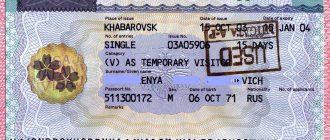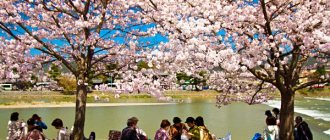Among the countries of the Asia-Pacific region, Japan occupies a special place. For several decades now, this state has been a generally recognized technological leader, without losing its national identity. If we also take into account that the Land of the Rising Sun has a very high standard of living, it becomes clear why some of our fellow citizens are increasingly thinking about how to move to Japan from Russia. However, it is worth noting right away that desire alone will not be enough. Unlike some other countries, Japanese legislation does not encourage the influx of immigrants.
Advantages of living in Japan
The reasons why people want to move to another country can vary. Typically, this happens because a person wants to improve their quality of life or provide a more promising future for their children. Some are forced to emigrate to Japan for personal reasons - having entered into family ties with a citizen of this country. One way or another, regardless of the reasons that forced a person to contact the Japanese consulate, it is worth recognizing that moving to the Land of the Rising Sun has a number of objective advantages for a foreigner. Especially when we are talking about citizens of Russia and other CIS countries.
The most significant advantage here is the high level of development of Japan. This applies not only to the size of salaries, but also to the quality of medical care, safety and many other factors that determine the convenience of living. In addition, a European in this country has some advantages over the Japanese. For example, knowledge of Russian and English provides additional employment opportunities.
Some people will probably be interested in the fact that Japan has a fairly warm climate. Severe winter frosts bypass most of the territory of this country. The only exception is the northern island of Hokkaido, where in January-February the temperature occasionally drops to -15 - -20°C.
At the same time, in summer you should be prepared for heat up to +30°C and above. Considering that the July heat here is always accompanied by high humidity, this weather may not be to everyone’s liking.
What are the disadvantages
When considering whether to move to Japan, you need to pay attention not only to the obvious advantages, but also to the disadvantages. Firstly, the immigration procedure itself to Japan is much more complicated than to the EU countries. The issuance or extension of a work visa does not imply the possibility that after its expiration the foreigner will be able to obtain a residence permit. Only highly qualified specialists with higher education and experience in their specialty can count on this status.
Secondly, it is worth taking into account the significant differences in mentality between the Japanese and Russians. A European will always remain a “black sheep” among local residents. And if in Tokyo, given the considerable number of foreign tourists, this is not felt so strongly, then in the provinces it will be very difficult for a native of Russia to assimilate among the locals.
Thirdly, unlike European languages with the Latin alphabet, Japan uses a system of hieroglyphs. Without first learning the local language, a foreigner cannot even read a sign on a store. Japanese is one of the most difficult languages in Asia.
Highly qualified specialists
Despite the strict policy of the Japanese immigration service, the government still shows interest in the workforce among foreigners. This applies to highly qualified specialists who not only have completed higher education in a reputable educational institution and have impressive work experience, but also have a perfect command of English and at least a conversational level of Japanese.
For qualified specialists who come to live and work in Japan, the country's government is developing special programs. They include:
- Continued training and improvement of professional skills.
- Professional retraining in accordance with the requirements.
- Improving management skills.
- Gaining entrepreneurial skills from a curriculum course.
Japan remains the most open to qualified specialists and neighboring countries, such as China, Vietnam, Thailand, the Philippines, and Indonesia. The similarity of languages and mentalities characteristic of residents of eastern countries plays a big role here.
Country's immigration policy
As in the vast majority of other countries, in order to go to Japan, a Russian citizen must have legal grounds for this. Most often, family ties are used in this sense (family reunification, moving to the homeland of the husband or wife). Immigration can also be facilitated by investments in Japanese businesses or the purchase of expensive real estate in this country.
It will be most difficult for foreigners to obtain a residence permit who do not have in-demand professional skills or education. Japan's immigration policy is extremely picky about unskilled and semi-skilled workers who came to the country on a work visa and want to stay here.
Unskilled work
One of the most popular desires of everyone who wants to move to a developed country is to start finding a job. And of course, the most in demand among immigrants is unskilled work. However, the interests of the Japanese government are radically at odds with the wishes of immigrants. It is unskilled labor that is not welcomed by the Japanese authorities.
Officially, only two types of foreigners can get unskilled jobs: students and interns. However, government restrictions are often circumvented. Especially small business owners in Japan. Entrepreneurs cannot afford to hire their compatriots, since the latter, even in unskilled work, make high demands on working conditions, which cannot be said about immigrants from economically weaker countries. In this way, small business owners employ immigrants illegally.
The procedure for obtaining residence permit and permanent residence
To move to Japan, you must obtain an entry visa to this country. Consular offices located in Russia do not issue residence permits; this is the prerogative of the Immigration Department of the Ministry of Justice of Japan. The maximum that a Russian can count on when applying to a Japanese diplomatic mission is the issuance of a long-term visa. This document may have the following category:
- Work Visa;
- educational (student);
- wife/husband visa;
- guest;
- business (business visa).
Tourist, transit and other short-term visas should not be taken into account. Staying in Japan for a short visit cannot be grounds for filing an application for a residence permit. To successfully immigrate, an applicant for a residence permit will need to live in Japan legally for at least a year. Most often, a residence permit is issued 2-3 years after the work visa has been repeatedly extended.
Visa application
The first thing you need to move to Japan is to obtain an entry permit. Then, already in Tokyo or another city in this country, it will be necessary to build on the current legal status.
A visa to Japan for Russians in 2021 is issued at consulates located:
- in Moscow;
- in St. Petersburg;
- in Khabarovsk;
- in Vladivostok;
- in Yuzhno-Kurilsk.
Before contacting a diplomatic mission, a citizen must prepare a package of necessary documents. It includes:
- a foreign passport, the validity of which is 2-3 months longer than the expiration date of the requested visa;
- the basis document (invitation, employment contract, certificate of enrollment as a student, training agreement, marriage registration certificate with a Japanese citizen, etc.);
- a completed application form (the form is available for download on the official website of the Japanese Embassy);
- two photographs 4.5 by 4.5 cm;
- a photocopy of the pages of the internal passport with a photograph, owner’s data and registration address.
In addition to the specified documents, depending on the visa category and the purpose of the visit to Japan, the consulate may request additional certificates or certificates: education diploma, power of attorney, etc. To avoid problems, it is recommended to clarify the list of documents in advance by visiting a special section of the Japanese Embassy website.
Unlike many other diplomatic missions, there is no consular fee when requesting a visa to Japan. This rule applies regardless of the type of visa document required.
Review results
Having applied for a long-term visa to Japan, a citizen has the right to count on a relatively quick response. According to the internal rules of the embassy of this country, the consideration of the submitted application and accompanying documentation must be completed within 4 working days. When accepting documents, the citizen will be informed of the date when he can pick up his passport with an open visa and the originals of previously provided documents.
Based on the results of consideration of the submitted application by the consul, one of three decisions can be made:
- on approval of a visa application;
- about the return of the application due to incorrect execution or incomplete completion of documents (re-submission is allowed);
- refusal to issue a visa.
Migration stamp
The entry permit to Japan takes the form of a sticker with holography and other security elements. The visa is pasted into the first blank page of the passport. Information is printed in English.
Directly upon passing border control at the airport or seaport, a migration stamp will be affixed to the foreigner’s international passport confirming border crossing. The same procedure is followed when leaving Japan.
Read also: How many people live in Japan Average salary in Japan
About applying for a visa
How to move to Japan? Practice shows that for this you first need to obtain a visa. Today, there are several types of permits that allow you to cross the border of a country and stay within its territorial boundaries for a certain time. Of these, the following types are most often issued: work, decree (for spouses, relatives of Japanese citizens), official and diplomatic, as well as general.
It should be noted that the process of obtaining such a permit is quite lengthy, since Japan is a country of bureaucrats. To obtain a visa to the state, you need to collect a large package of documents and personally visit the diplomatic mission office located in Russia. If a visa is issued, some problems may arise during the trip to Japan, including deportation.
Methods for obtaining a residence permit
There is only one option to obtain a residence permit in Japan. A foreigner already in this country on a work or “family” visa must contact the immigration office of the local prefecture. In addition to the application in the established form, the form of which can be obtained directly upon application, the citizen will have to provide a number of documents. Depending on the legal status of the potential immigrant, this list may include:
- certificate from place of work;
- marriage certificate with a Japanese citizen;
- bank account statement;
- business registration certificate;
- an extract confirming ownership of real estate in Japan.
It is important to understand that in the absence of a permanent job or other legal source of income that allows you to maintain a standard of living at an acceptable level for Japan, you should not count on the satisfaction of your application for a residence permit. Considering that there are a lot of people who want to move to this country, local migration authorities are extremely selective in considering applications for a residence permit.
Official employment in the country
In the absence of a spouse or close relatives who have Japanese citizenship, to successfully obtain a residence permit you will need to provide proof of employment. To do this, the employer will have to issue an official certificate of the foreign employee’s current position indicating the date of employment and salary. The document must have a seal, the signature of the director and details of the enterprise.
A certificate from the place of employment can be used to obtain a residence permit only if we are talking about a highly qualified employee with a higher education. If we are talking about low-paid physical work, then such work for foreigners in Japan is not the basis for obtaining a residence permit. As a rule, such citizens simply have their work visa extended for the next year.
Studies
Studying in Japan is not grounds for obtaining a residence permit, even if the foreign student is admitted to a local university or college. Studying at a university or taking language courses lasting less than a year also does not imply the issuance of a residence permit. To do this, a foreigner is issued a student visa, the validity of which corresponds to the duration of study with an additional corridor of 1-2 months for entry and exit. For students of higher education institutions, entry permits are renewed annually based on the provision of a certificate confirming the continuation of studies in the new academic year.
Upon marriage
It is believed that the easiest way to move to the Land of the Rising Sun is to marry a Japanese woman. On the one hand, this is true. If you have an officially issued marriage registration certificate, the visa will be issued without any problems. However, to obtain a full-fledged residence permit, you will have to live in Japan for at least 3 years, renewing your entry permit annually.
This precaution was introduced by local authorities in order to prevent the conclusion of fictitious marriages. At the same time, migration service employees will from time to time visit the newlyweds to check whether they are really in a family relationship. If within 3 years it is discovered that the marriage has not broken up and is not fictitious, the spouse will be issued a residence permit.
If you wish, you can bypass the procedure for obtaining a residence permit. The spouse of a Japanese citizen has the right to immediately apply for a passport from this country. There are only two requirements: you need to be the husband (wife) of a Japanese woman for 3 years and live in Japan for at least one year.
Responsibility for a fictitious union
A marriage entered into only for the purpose of moving to permanent residence, and not to start a family, is formally equated to deception. If it is discovered that spouses, one of whom is a foreign citizen and the other has Japanese citizenship, are not actually married, the migration service inspector notifies senior management about this. Then, based on the collected evidence, a written explanation is taken from both “spouses”. As a rule, after this the case is sent to the court, which decides to change the legal status of the foreigner’s stay.
If it is proven in court that a citizen of another country entered into a fictitious marriage for the purpose of moving to Japan, he will be deprived of his residence permit and deported. At the same time, the official divorce of spouses is not a reason for the deportation of one of them. A foreign citizen retains the right to temporarily stay in Japan until the expiration of the residence permit. Then he will have to leave the country or apply for an extension of his residence permit, providing other legal grounds (having a permanent well-paid job, real estate or bank account, studying at a Japanese university, etc.).
Choosing a city
Most often, many migrants choose the Japanese capital, Tokyo, to move. The largest number of higher education institutions in the country, financial companies, large enterprises, cultural and sports facilities are located here. But it should be borne in mind that at the highest level of wages, the highest living expenses in the country are recorded here.
What other cities do Russian migrants prefer:
- Osaka is located slightly south of Tokyo. This city is annually included in various ratings of the best settlements to live on the planet. Its territory is divided into 3 sectors, in which agricultural, industrial, and trading companies are located.
- Nagasaki is a large port city, the administrative and commercial center of the country.
- Kadoma, Aomori, Akishima, Saitama, Misato are settlements located in close proximity to large cities, not too numerous in terms of the number of inhabitants, but with lower prices for everyday expenses.
It is also necessary to take into account such factors as climate. Japan is an island state with a large number of bodies of water. In addition, possible earthquakes and tsunamis should be taken into account.
The state is located from north to south, and therefore the island of Hokkaido has the harshest climate. The climate is moderate in Honshu and Shikoku, and the warmest in Okinawa and Ryukyu.
permanent residence
When thinking about how to go to Japan for permanent residence, it is worth considering that citizenship of this country is much more difficult to obtain than in most other countries. First, you need to live in the country for 1-2 years, renewing your long-term visa. If everything is in order with work or other legal grounds, you can apply for a residence permit. As the experience of many Russians who moved to Japan shows, you can count on a positive decision on granting a residence permit only after 3 years of residence in the country.
Then you will need to live in Japan for another 5 years with a residence permit. And only then, after approximately 8-10 years have passed since the move, a foreigner can apply for citizenship.
A Japanese passport is not issued automatically, but after an interview with a representative of the migration department. If a foreigner, over the years of residence, has not learned the local language, has not acquired a permanent job, or has had claims against him from law enforcement agencies, he should not count on citizenship.
Specified Requirements
The procedure for moving to Japan for permanent residence from Russia in 2021 has not undergone any changes. First, you need to apply for a long-term visa that provides the opportunity for temporary residence. Then, after arriving in Japan, you need to take care of obtaining a status that gives the right to issue a residence permit. It could be:
- work in a Japanese company or teaching at a university;
- family reunification (moving to the homeland of the spouse or close relatives);
- large investments in the Japanese economy;
- belonging to the family of a foreign citizen who has already received a residence permit;
- refugee status.
Foreign citizens can count on obtaining citizenship if they:
- have legally resided in Japan for at least 10 years without any claims from law enforcement or tax authorities;
- have a permanent job, business or other legal way of earning money;
- do not pose a threat to Japan's national security;
- have made a special contribution to science, culture, sports or another area of activity of Japanese society.
What documents are needed
The next thing you need to move to Japan is a certain package of documents. At the visa application stage you will need:
- Completed visa application form.
- Photo.
- Foreign passport (copy and original).
- Copy of civil passport.
- Invitation from the host party.
- Confirmation of housing availability.
- Insurance.
- Marriage or divorce certificate.
- Child's birth certificate, if available.
- Certificate of absence of dangerous diseases.
- Certificate of good conduct.
- Financial guarantees of the applicant's solvency or sponsorship letter.
To apply for a residence permit, you will need the same package of documents, only with a valid visa of the required category.
When applying for permanent residence, the package of documents will need to be supplemented:
- Autobiography.
- An extract from the tax authority stating that the applicant consistently paid taxes throughout the time spent in Japan.
- Bank account statement.
- Certificate of Eligibility.
- Valid residence permit.
- A certificate from work or a letter of sponsorship.
All documents drawn up in a foreign language must be translated into Japanese and notarized.
When requesting citizenship, the package of documents does not change. It will need to be supplemented with confirmation of the renunciation of previous citizenship (Japanese law does not provide for dual citizenship), insurance in the amount of 20,000 yen per year (about $200) and proof of at least $25,000 in the account.
The article “Renunciation of Russian citizenship in 2021: the procedure for renouncing citizenship” tells how to renounce Russian citizenship.
Features of deportation of foreign citizens
Japan has a very low crime rate. Not least of all, this achievement is due to the fact that local legislation is extremely strict regarding foreigners who have problems with law enforcement agencies. At the slightest suspicion of engaging in illegal activities, the offender will be deported without unnecessary delay. The most common reasons for deportation from the country are:
- violation of the terms of stay in Japan;
- engaging in activities that do not correspond to the visa category;
- the entry into force of a court order according to which the foreigner must be deported;
- suspicion of criminal activity (drug trafficking, prostitution, pimping, etc.);
- the actions of a foreigner may pose a potential threat to the security of the country.
No less interesting is getting to know Japanese medicine.
I had to meet her after I fainted and hit my head on the wooden floor of a traditional tea house. I went to the hospital about a week after the incident, when my sore neck and inability to turn my head began to frankly frighten me.
The first question they asked me at the reception, after I briefly described the situation, was “So what do you want to know? Why did you faint or what happened to your neck? I chose the second option.
I spent the next half hour at the reception desk, filling out a patient card. I was helped in this difficult matter by an elderly Japanese man who, although poorly, still spoke English. So my knowledge of Japanese and his English successfully compensated for each other to everyone’s satisfaction. By the way, it would be more correct to say that he did not help me, but did everything for me. During registration, I had to strain just to get my insurance certificate and then sign the card.
I was sent to the orthopedic department for examination. I would like to note the ideal cleanliness of the hospital, the presence of signs and the friendliness of the staff.
The doctor, having examined me and found out what happened, sent me for an x-ray. The department was located at the other end of the hospital, but I found it very quickly.
A nurse met me there, took my card and took me to the locker room. There are lockers in the locker room where patients leave personal belongings, including jewelry, and they also give you special T-shirts for going to the X-ray.
After taking all the required pictures, I went back to the orthopedist. They didn’t give me any hands-on pictures, but when I entered the doctor’s office, he was already looking at my bones on the monitor. So much for technology. Fortunately, all my fears were in vain. Diagnosis of sprain, recommendations – neck gymnastics. That's it, goodbye. The entire trip, including x-rays, cost about 6,000 yen (about 2,000 rubles).
One of the orthopedic clinics in Kyoto
Since we're talking about medicine, I'll mention one more thing - the problem with hair. And this doesn't just apply to me. A friend of mine, who has been living here for more than two years, at some point decided that she was sick with something terrible, because her hair was coming out in clumps. In my case, the problem, fortunately, did not reach such an extreme, but I had to worry and run to doctors in Moscow during the holidays.
The fact is that the hair becomes dry and brittle. Being the owner of a waist-length braid, I was in despair. I've never had such a problem.
And recently I met a girl from Brazil. She had only been in Kyoto for two months and also complained that her hair was dry.
I can’t say what the reason is. Most likely, a change in diet and the absence of the usual cheese, sour cream, and the meat here is almost transparent. Maybe the water quality.
Extension of stay status
Like an entry permit, a residence permit has a limited validity period. It is usually issued for 3 or 5 years. If you want to extend your residence permit, a foreign citizen must contact the migration service of the local justice department. You can find the location of this institution and contact numbers on the website of the prefecture at your place of residence.
Before contacting the migration service, you must ensure that you have all the documents necessary to renew your residence permit. This is especially important if the legal status on the basis of which the residence permit was previously issued has changed.
How to become a Japanese citizen
Despite the fact that a passport of a Japanese citizen provides its owner with considerable advantages, including visa-free entry into most countries of the world, one should not forget about the existing negative aspects. Before becoming a citizen of the Land of the Rising Sun, a foreigner will have to renounce his previous citizenship. Thus, if you want to visit relatives, a former Russian citizen will have to apply for a visa at the Russian Consulate.
Japanese citizenship is difficult to obtain even with sufficient grounds. The most difficult thing will be passing the Japanese language exam. In addition, all foreigners are required to live in that country for some time before applying to change their passport. This period can range from 1 year (for a spouse) to 8-10 years (for everyone else).
JET training program
Japan is an advanced country that has business relations with many other countries.
To simplify the partnership, the JET program was launched. As part of it, foreign citizens from different countries are invited to Japan to teach languages in schools and higher education institutions. Read also: Emigration to Finland from Russia
You should check with the consulate about the availability of vacancies. There, employees will describe in detail the format of the work and provide a list of required papers for registration.











